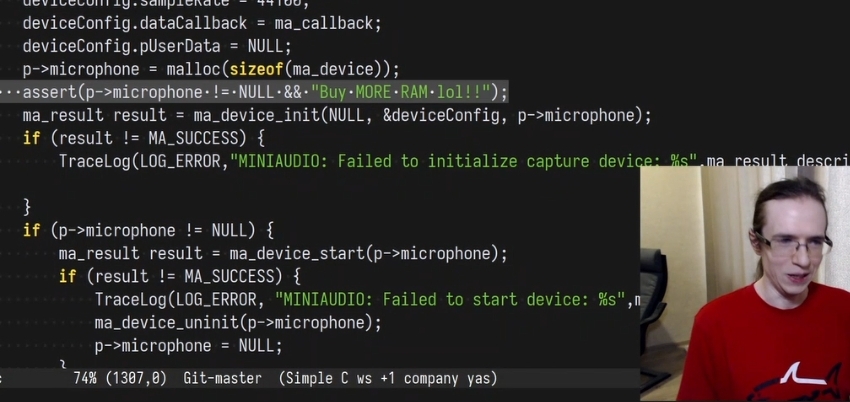My favorite compile error happened while I was taking a Haskell class.
ghc: panic! (the ‘impossible’ happened)
The issue is plainly stated, and it provides clear next steps to the developer.
I had a similar error, though not from the compiler
Error message just readthis should never happenAh, good old PlarformIO
puts me in mind of the old guru meditation error messages that popped up in the stone knives and bearskins era of computing.
Nevermind that the C++ program is two orders of magnitude faster when completed.
I would love to learn and use Rust but I’m a embedded systems guy. Everything of consequence is C and C++.
If the embedded system is old or poorly-maintained enough, there might be more Rust than you’d think.
Rust seems pretty performant
https://benchmarksgame-team.pages.debian.net/benchmarksgame/fastest/rust-gpp.html
I meant faster than Python, not faster than Rust. Rust is fast.
There’s embedded rust for a few platforms. Using it on ESPs is fun
Embedded C entered the chat
Your loop had a race condition, so we let the smoke out for you.
Can’t believe that my code is racist smh
Ho hoo, that isn’t smoke, it’s steam, from the steamed rams we’re having! Mmm, steamed rams.
// I am responsible for every byte of this code and still don't know why this line breaks everything.
Except the C++ “Core dumped” line is telling you it just wrote a file out with the full state of the program at the time of the crash, you can load it up and see where it crashed and then go and look at what every local variable was at the time of the crash.
Pretty sure you can even step backwards in time with a good debugger to find out exactly how you got to the state you’re currently in.
Where does it write the file
Nobody knows
deleted by creator
On a secret FBI server somewhere where they watch your failures and laugh
deleted by creator
I believe it’s
/var/lib/apport/coredumpon Ubuntu.imagine if it, like, told you this so you didn’t have to find out about it via a post on lemmy
imagine if it like, read that file and gave you a stack trace
gdb gives you waaaaaaaaaaaaaaay more than a stack trace.
I love gdb! I recently had to do a debug and wow its so cool! On gentoo I can compile everything with symbols and source and can do a complete stack trace.
Am I the only one in this thread who uses VSCode + GDB together? The inspection panes and ability to breakpoint and hover over variables to drill down in them is just great, seems like everyone should set up their own c_cpp_properties.json && tasks.json files and give it a try.
…unless you build the executable with optimizations that remove the stack frame. Good luck debugging that sucker!
i mean you’re expected to know the basic functioning of the compiler when you use it
Imagine if you knew the most basic foundational features of the language you were using.
Next we’ll teach you about this neat thing called the compiler.
I’m not a C/C++ dev, but isn’t
apportUbuntu’s crash reporter? Why would dumps be going into there?Though on a rhetorical thought, I am aware of systemd’s
coredumptctlso perhaps its collecting dumps the same way systemd does.https://wiki.ubuntu.com/Apport
It intentionally acts as an intercept for such things, so that core dumps can be nicely packaged up and sent to maintainers in a GUI-friendly way so maintainers can get valuable debugging information even from non-tech-savvy users. If you’re running something on the terminal, it won’t be intercepted and the core dump will be put in the working directory of the binary, but if you executed it through the GUI it will.
Assuming, of course, you turn crash interception on- it’s off by default since it might contain sensitive info. Apport itself is always on and running to handle Ubuntu errors, but the crash interception needs enabled.
Ah I see, that’s actually pretty cool - thanks!
If you are using systemd, there’s a tool called coredumpctl.
tl;dw: writes to the path in
/proc/sys/kernel/core_pattern
Why doesn’t JavaScript have tracebacks?
How useful would they be when they rely to such a large extent on various callback functions?

The guy is testing the result of malloc and you are complaining about how?
https://www.youtube.com/@TsodingDaily
If you’re a programmer, or think you might want to be one, I highly recommend this channel. He’s a savant at all sorts of low level things, quite funny and entertaining, and does a fantastic job of explaining what’s going on.
tsoding’s channel is one I look forward to watching every single day, never a dull moment in his streams/videos.
If you’re someone who likes to watch things live, his Twitch channel is available here.
Good gods, a long-form content creator! Will be checking this out later
At least you are getting a dump, count your blessings. Could be worse!
Just hook your app to a debugger and load the dump.
Joke on you until the python program segfaults
If it does it’s because of C/C++ code
No bounds checking, only fast.
This right here - C++ iirc is used mostly for microprocessor code in an industry setting, where EXTENSIVE testing is done so that bloated code doesn’t need to constantly check for programmer errors every single time, i.e. where execution speed is prioritized over programmer development time. And whenever that is not the case, well, as OP pointed out, other higher-level languages also exist (implication: to choose from).
deleted by creator
Lots of those in C# now, especially with Unity coming along like it did.
C++ iirc is used mostly for microprocessor code
lol no, it’s used almost everywhere where performance is important and people want(ed) OOP, from tiny projects to web browsers (Chrome, Firefox) to game engines (Unreal, CryEngine). Many of these are hugely complex and do encounter segfaults on a somewhat frequent basis.
Saying C++ is mostly used for embedded applications is like saying C# is mostly used for scripting games, i.e. it doesn’t nearly cover all the use cases.
higher-level languages also exist
This depends on your definition of “higher-level”, but many people would argue that C++ is on a similar level to Java or C# in terms of abstraction. The latter two do, however, have a garbage collector, which vastly simplifies memory management for the programmer(generally anyway).
I also currently use it for a new project since all needed 3rd party libraries are from a very specific domain and the project has a deadline, so writing and testing wrappers for Rust that would provide me with any meaningful advantages down the road are too costly to budget for before the deadline.
That could become part of a future refactoring, though.
There is bounds checking, but it’s opt-in. I often enable it on debug builds.
C#: Time for a treasure hunt! Find the Null Reference Exception. Here’s a map. X marks the spot.
C# tells you the call site/method name and line number right at the top. It’s only really annoying when you have aggregate exceptions, which sometimes occur because someone async’d wrong
Actually getting there is the other part. It’s not like java where you can go down the chain if the problem isn’t where it says it is.
Rust developer: I’d like to compile some code
Rust compiler: the fuck you are
The rust compiler holds your hand, wraps you in blankets, makes you hot chocolate, kisses you on the forehead before it gently and politely points out what you did wrong and how you can solve it step-by-step. It would never think of something as heinous as swearing at you, shame on you for insulting my wife’s honour like this.
Rust compiler is passive agressive, like:
“There’s an error at line 286 because you still don’t know how to use the borrow checker after all this time ♥️”
deleted by creator
deleted by creator
except when it gives errors about lifetimes of some object.
boy, that makes my brain hurt
Damn right. And once it compiles… it works.
Meet my friend: .unwrap()
Fair.
The rust compiler produces a flawless understanding of your code, and then quits out because understanding that code is a Nightly-only feature and you’re using the stable build.
I need a rust compiler in my life 😍
This C++ message has an urgency vibes to it:
“Segmentation fault!! Drop the Nuclear Reactor quick!!”
Average C++ error

gdb: Am I a joke to you?
Yes. It’s a surprisingly bad debugger the more you think about it. I use it largely in assembly and it loves to spit out random errors about memory it tried to access based on the current register state. The shortcuts are kind of dumb.
It certainly works but I wouldn’t call it a pleasure to use.
I honestly vastly prefer using IDA and Windows specific tools (x64dbg) over gdb. IDA can interface with gdb so it can act as a frontend which can be handy for visualization.
I use gdb with great success for x64, rv64, and c:
info registers ripor just setup tui:# ~/.config/gdb/gdbinit: tui new-layout default regs 1 {-horizontal src 1 asm 1} 2 status 0 cmd 1 tui layout default tui enable
I know this is supposed to be humorous, but there’s a reason why these languages can, and are doing what they’re doing.
Core dumps are also worth learning about, they’re really helpful if you understand them.


















